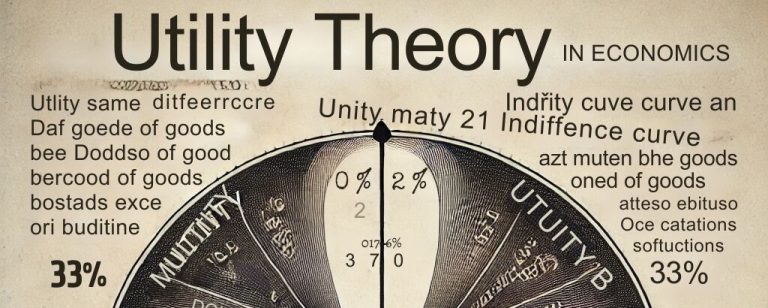Utility theory in economics is a fundamental concept that explains how individuals make consumption decisions based on the satisfaction or benefit they derive from goods and services. It looks at how much of the goods people consume and the utility satisfaction derived from them. Utility theory helps economists, business people, and policymakers understand how consumers behave. Demand curves are drawn, and market trends are established. Through utility analysis, we understand how best consumers can allocate their resources to maximize their well-being.
What is Utility Theory?
Utility theory in economics is the study of how individuals or consumers make decisions to allocate their limited resources (income) to maximize their satisfaction or utility. In economic terms, utility refers to the satisfaction or pleasure derived from consuming goods and services. The core principle of utility theory is that consumers make decisions to maximize their total utility. There are several important concepts related to utility theory, including:
- Total Utility: The overall satisfaction a consumer receives from consuming a certain quantity of goods or services.
- Marginal Utility: The additional satisfaction or utility gained from consuming one more unit of a good or service.
- Diminishing Marginal Utility: The principle says that the additional satisfaction derived from each additional unit tends to decrease.
Utility Theory Example
A consumer with $100 to spend may choose to buy a combination of two goods, say apples and bananas. If the consumer gains more utility from each apple than from each banana. They may allocate more of their budget to apples. Over time, the consumer may experience diminishing marginal utility. This means the extra satisfaction from consuming each additional apple decreases as they buy more.
How to Measure Utility Theory in Economics?
Measuring utility in economics is not a straightforward task. As utility is a subjective concept that varies from person to person. However, economists use several methods to quantify utility, with the most common being cardinal utility and ordinal utility approaches.
Cardinal Utility Measurement
In the cardinal utility approach, utility is measured in absolute terms, and it assumes that the satisfaction a person receives from consuming a good can be measured in numerical units, known as utils. For instance, if a person derives 10 utils from consuming an apple and 5 utils from consuming a banana, this difference can be quantified and compared.
The formula for Cardinal Utility
Ordinal Utility Measurement
The ordinal utility approach does not assign numerical values to utility but instead ranks preferences. In this approach, consumers are assumed to rank different bundles of goods based on their preference for each.
A consumer might rank two bundles of goods as Bundle A is preferred to Bundle B without indicating how much more satisfaction is derived from Bundle A.
Ordinal utility focuses on the order of preferences rather than the magnitude of satisfaction. It is more widely used because it does not require precise measurement of utility, which is difficult to achieve.
Marginal Utility Measurement
Marginal utility is the additional satisfaction gained from consuming one more unit of a good. It is a crucial concept in utility theory because it helps to explain how consumers allocate their resources.
The formula for Marginal Utility
Tools to Measure Utility
- Indifference Curves: These curves represent different combinations of two goods that yield the same level of utility for the consumer. Indifference curves are used to understand consumer preferences and decision-making.
- Budget Line: The budget line shows all the combinations of goods a consumer can purchase given their income and the prices of goods. The optimal consumption point is where the budget line is tangent to the highest possible indifference curve.
Importance of Utility Theory
It serves as the foundation for several key areas in economics, including microeconomics, market theory, and price theory.
- Understanding Consumer Behavior: Utility theory helps explain why consumers make specific choices regarding what to purchase and how much to spend. It sheds light on the decision-making process, allowing businesses and policymakers to predict how changes in prices, income, or preferences might influence consumption patterns.
- Demand Curve Derivation: Utility theory plays a central role in the derivation of the demand curve, which shows the relationship between the price of a good and the quantity demanded by consumers. The theory of consumer behavior, based on utility maximization, helps explain how demand curves are shaped and why they slope downward.
- Pricing Strategies: Businesses use utility theory to determine pricing strategies that maximize consumer satisfaction and, consequently, profit. By understanding how consumers derive utility from goods, companies can price their products in a way that encourages purchases while still maintaining profitability.
- Public Policy Formulation: Governments and policymakers use utility theory to design policies that impact consumer welfare. By understanding how changes in prices, subsidies, or taxes affect consumer choices, policymakers can create policies. It aims to improve consumer well-being and overall economic efficiency.
Conclusion
Utility theory in economics provides a comprehensive understanding of how consumers make decisions about consumption to maximize their satisfaction. By explaining key concepts such as total utility, marginal utility, and the law of diminishing marginal utility. This theory helps us analyze demand patterns, derive demand curves, and formulate effective pricing and policy strategies. The insights derived from utility theory are crucial for economists, businesses, and policymakers alike, guiding decisions that shape market behavior and economic welfare.
Utility Theory in Economics FAQs
What is utility theory in economics?
Utility theory in economics is the study of how consumers make choices to maximize their satisfaction or utility given their budget constraints and preferences.
How is utility theory measured in economics?
Utility theory can be measured using cardinal utility (measuring satisfaction in numerical terms), ordinal utility (ranking preferences), or marginal utility (measuring additional satisfaction from consuming one more unit of a good).
Can you provide an example of utility theory?
An example of utility theory would be a consumer choosing between two goods, say apples and oranges. The consumer will allocate their budget based on which good provides them the most satisfaction or utility per dollar spent.
Why is utility theory important for businesses?
Utility theory helps businesses understand consumer preferences and behavior, allowing them to develop effective pricing, marketing, and product strategies.
What is the law of diminishing marginal utility?
The law of diminishing marginal utility states that as a person consumes more of a good. The additional satisfaction (marginal utility) gained from consuming each additional unit decreases.


